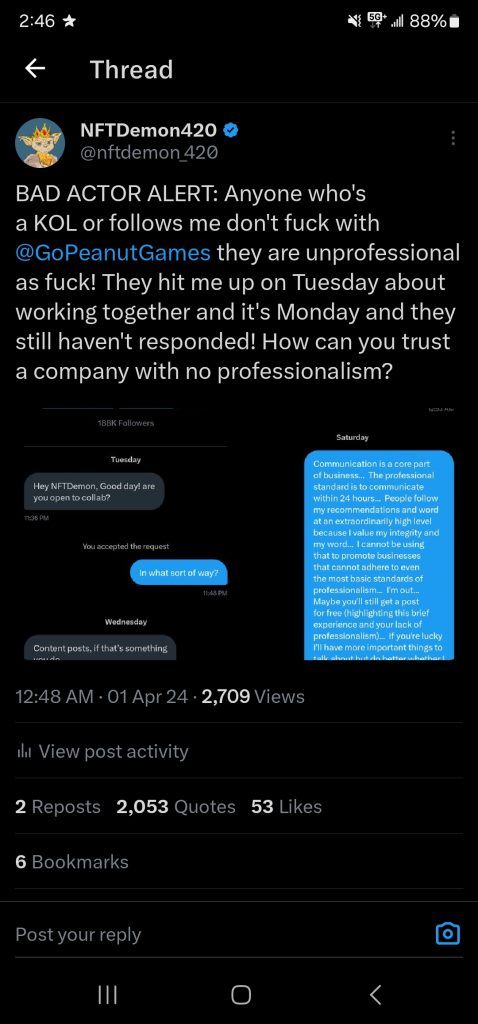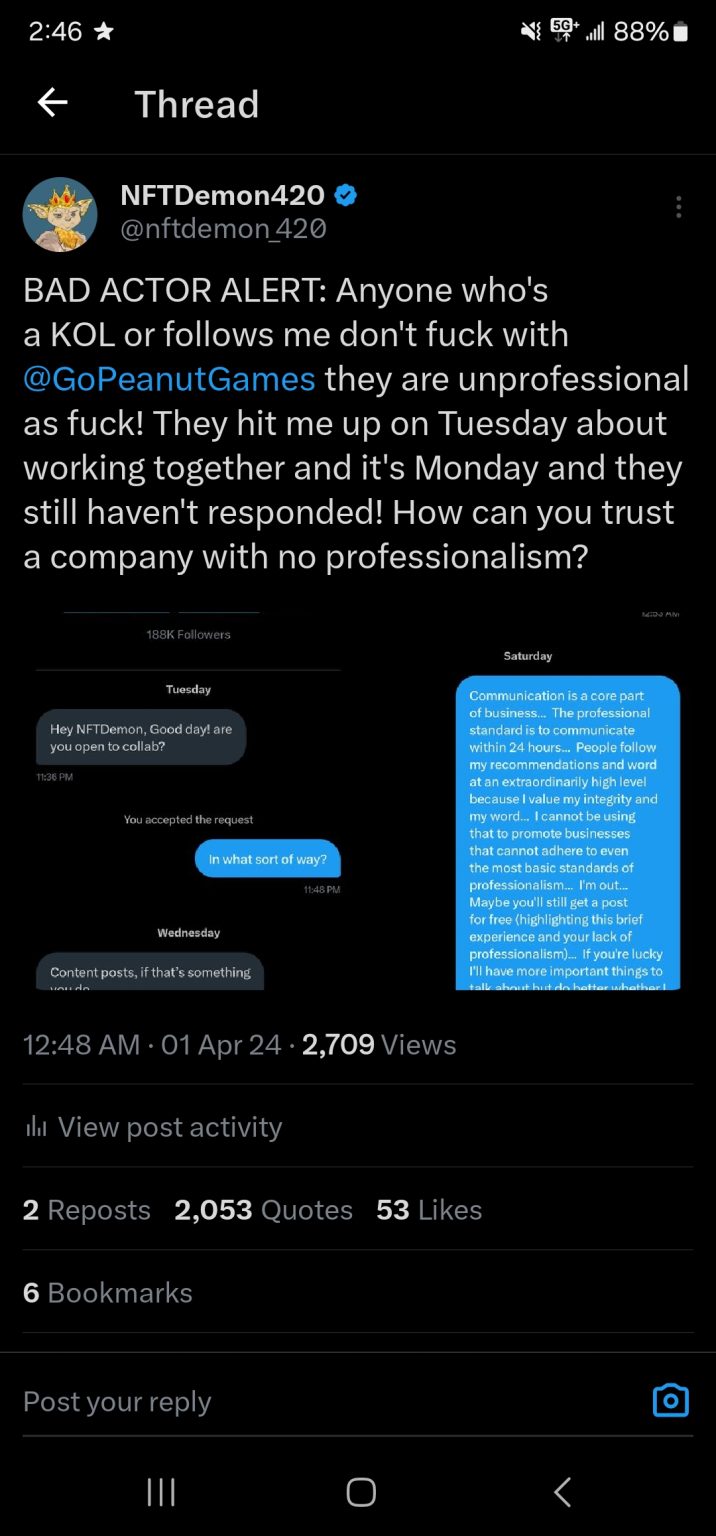
It seems as though every day there is another video game company entering web3. And renowned NFT artist Jeremy Ryan aka NFT Demon has been quick to call them out. Peanut Games is no exception. For those unaware Ryan is the largest NFT artist on the Binance Smart Chain with pieces owned by celebrities such as Eminem. His social media following is basically a who’s who in both the crypto and celebrity world with his various pages followed by people like Snoop Dogg, Justin Bieber, Britney Spears, Lady Gaga, Burger King, and countless others. He’s become the go to for various celebrities and Fortune 500 companies on blockchain matters.
Given his prominence and respect in the industry it would make sense a startup like Peanut Games would come ask him to do some promotion. And that’s exactly what they did. On a Tuesday. Ryan promptly responded back on that same Tuesday. And by Monday he hadn’t heard anything back from them so he went into attack mode (perhaps part of why they call him Demon) creating the Twitter post shown above. The facts of the particular case (as just outlined) are not in dispute nor is the timeline, both of which were confirmed by the company’s own CEO in a separate post on Twitter. The CEO stating the lack of response was because his company was too busy to respond.
The post received many comments virtually all of them siding with Ryan that the lack of response was unprofessional and that such a lack of professionalism was hurting the industry. It received just two comments in support of Peanut Games neither disagreeing it was unprofessional but both saying Ryan went to far and both only “liked” by associates and employees of Peanut Games. So was Ryan wrong to call them out so aggressively? Was Peanut Games unprofessional? And does that lack of professionalism hurt the entire industry.
First lets start off with whether or not Peanut games was unprofessional in their lack of response. To that question the answer seems to be an astounding yes. While there is little that addresses business etiquette on social media a quick google search for “professional response time email” will reveal nothing other than 24 hours as the time to respond from a professional sense. Some sites say in rare circumstances 48 hours is ok but should be avoided when possible. In fact even prestigious university Auburn University addresses it.
What is reasonable? Generally, you should aim to respond to all emails within a 24-hour timeframe (not to exceed 48 hours).
What if I don’t have an answer within 24 hours? Sometimes we’ll get questions that take time to answer, and that is ok. In that situation, you’ll want to respond within the appropriate window indicating that you’re looking into it and will get back to them. That way, the person emailing you isn’t scratching their head three days later wondering what in the heck you’re doing.
Auburn University
In this instance both sides agree that the response time was well beyond even the 48 hours and therefore would clearly be considered unprofessional. But did Ryan take it too far in calling them out? For this we turn to anthropology expert William Jenkins. According to Jenkins Ryans response may have been a bit extreme but not unwarranted. “Generally in human nature when someone does something wrong, particularly a business, like violating professional standards people will get upset. While some people will let it go its not unwarranted nor should be unexpected to come across someone who takes a more combative nature. In this instance the wrong is on the side who took action that would make a reasonable person upset and not in the side that responds unless such response crosses other lines such as violence”.
So now we’ve established that Peanut Games violated very clear professional standards and was in the wrong despite their refusal to acknowledge and apologize but does this hurt the entire industry. Was Ryan right in saying this sort of conduct is contributing to the lack of mass adoption? For this we go to Rebecca Clarke an author on mass adoption and blockchain. According to her examples like this are indeed one factor limiting mass adoption. “To the outside world crypto is like the wild wild west. It has no regulations or standards or accountability which is a primary reason why most people stay out of it. There’s this fear that the lack of accountability contributes to the number of scams. Unfortunately cases like this only further strengthen that fear. People see companies like Peanut Games not only operating outside of clearly defined professional standards in every other industry but actively standing behind that behavior and see no one calling them out and it gives more reason to stay away.”
So now that we’ve established, according to the experts, that Peanut games was not only wrong, but that Ryan was in many ways right you would think an apology would be in order. According to Ryan that wasn’t the case and according to the CEOs own Twitter (you can’t apologize for something you won’t even acknowledge). In fact, according to Ryan, the company mass reported his Twitter account getting it suspended. “What could have been just as easy to resolve is an acknowledgement and apology and promise to do better turned into them doubling down. They mass reported my Twitter account until it was taken down.” says Ryan, “But no worries this isn’t the first time or the last I will get it back. What they cannot get back is their dignity nor the hit this will continue to take on their image.”
What happens from here has yet to be seen but we will keep you updated on any future developments. In the meantime its worth thinking, as people in the industry, how much should we accept from businesses and at what point do we start to say they are doing more harm than good and speak up? This is a very individual question with many very individual answers however one thing remains clear. There is a lack of accountability in web3 and Peanut Games is only furthering that image the longer they continue to stand by their conduct.

